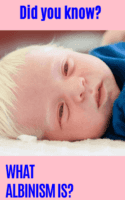“Why are you so white?” the young girl at the bus stop asked the teenage boy with white hair and white skin.
“I have albinism,” he gently said.
Have you ever wondered why some people seem to be so white and with white or yellow hair? People who present in this way usually have a skin condition called albinism.
What is albinism?
Albinism is a rare skin condition, inherited from parents. It is a genetic disorder which results in a lack of pigment melanin. Melanin is the chemical that gives the skin, hair and the iris of the eye their colour.
Some people make more melanin than others. A little bit of melanin will result in your hair, skin and the iris of your eyes having a very light colour, and more melanin will leave your hair, skin, and eyes being darker.
The amount of melanin your body makes depends on your genes.
Those suffering from albinism have extremely pale skin, hair and eyes. They may also have some patches of skin or hair that have a darker shade than other parts.
Complications with albinism
It is not life threatening, but those suffering from albinism may have to limit their outdoor activities as they cannot tolerate being in the sun for long, as the lack of melanin reduces the skin’s ability to protect itself from UV rays.
People with albinism cannot be in the sun too long as their skin is very sensitive to sunlight as a result of the lack of melanin. They are susceptible to skin cancer. People with albinism also have problems with their eyes, such as far or near nearsightedness problems, squinting, monocular vision (relying only on one eye for sight) and becoming cross-eyed.
Treatment and care for albinism
People with albinism have to take extra care to protect their skin from sun exposure; this will reduce the chances of sunburn and skin cancer. They need to use sunscreen of at least SPF 30 or more, wear good quality sunglasses, cover up in the sun with hats or using an umbrella.
When it comes to eye care, treatment options such as corrective glasses and contact lenses may help to improve their vision. Using correct lighting can help reduce the strain on the eye sight within the home. Children in school will need additional help to see distant objects in the classroom. Training and counselling may be required to equip teachers who handle children with albinism.
Albinism and society’s stigma
There is a huge stigma around people with albinism, resulting in them getting bullied or avoided at school. People with albinism are made fun of because of their appearance. People with albinism stand out because of their very pale or white complexion, bright yellow hair or white hair. There is a stigma around albinism, many people label them as “albino” which can be dehumanising to some. In schools, children often tease people with albinism because of the lack of understanding. It is therefore important that schools educate students on the different learners.
Albinism and witchcraft
Throughout Africa, people with albinism, especially children, have been the victims of brutal attacks and murder in the name of witchcraft, superstition, and wealth. The atrocities committed against people with albinism have received widespread attention because of various crimes reported, such as infanticide, kidnapping, amputations, and decapitations, committed for purposes of supplying highly valued body parts used for amulets, which are then sold in underground witchcraft markets.
People with albinism often live in a constant state of guilt and angst, and are often forced to flee their homes and live in solitude to avoid these human hunters.
Is albinism a disability?
People with albinism are usually healthy, their growth and development are healthy like anyone else. However, because of the associated visual impairments that come with albinism it can be classified as a disability. Having albinism has has no impact on the intelligence of a person.
In essence, a person with albinism is no different to any other person. The only difference is the lack of melanin, however they should not be treated differently or be made fun of. If you know someone who has albinism, be sure to include them in your activities instead and stopping the stigma. If you have albinism, embrace your skin because that is what makes you beautifully unique.
***
Have you ever wondered what causes beer bellies? Read here to find out more.
Tell us: What do you think can be done to combat the stigma associated with albinism in society?


